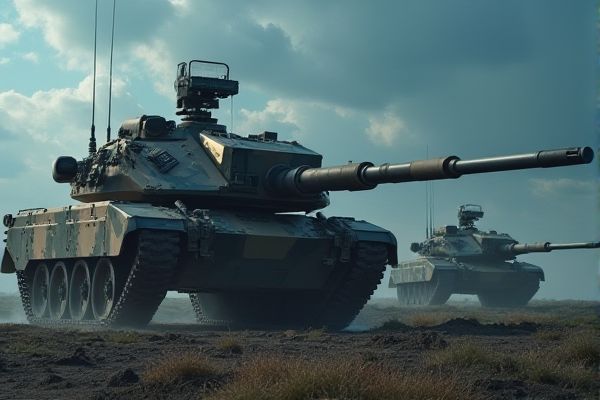
AI enhances military defense through advanced data analysis, improving situational awareness and decision-making processes. Algorithms can assess vast amounts of intelligence, identifying patterns and potential threats more efficiently than human analysts. Autonomous systems, such as drones and ground vehicles, perform reconnaissance and logistics tasks, reducing the risk to personnel. Machine learning models contribute to predictive maintenance of equipment, ensuring operational readiness and resource optimization.
AI usage in military defense
Autonomous Drones
Autonomous drones have the potential to enhance military defense by providing real-time surveillance and reconnaissance capabilities. These drones can operate in hazardous environments, reducing risks to human personnel. Their ability to process large amounts of data quickly may improve decision-making during missions. For instance, institutions like DARPA are exploring these technologies to advance national security initiatives.
Cybersecurity Enhancement
AI integration in military defense can enhance decision-making speed and accuracy, leading to more effective operations. The use of predictive analytics in cybersecurity allows organizations to identify potential threats before they manifest, safeguarding sensitive data. For example, systems employed by the U.S. Department of Defense can analyze patterns in cyber attacks to mitigate risks more efficiently. This technological advancement presents the possibility of reducing vulnerabilities and improving overall security infrastructure.
Target Recognition Systems
AI usage in military defense can enhance target recognition systems, improving accuracy and efficiency in identifying threats. These systems leverage machine learning algorithms to analyze vast amounts of data from surveillance feeds and sensors. For instance, projects at institutions like DARPA demonstrate the potential of AI in distinguishing between combatants and non-combatants in real-time scenarios. The incorporation of such technology could significantly reduce collateral damage during operations.
Predictive Analytics
The integration of AI into military defense can enhance decision-making processes through predictive analytics. For instance, the analysis of historical data can identify potential threats and optimize resource allocation. These advancements may allow for more efficient strategic planning, potentially reducing response times in critical situations. The US Department of Defense actively explores these technologies to improve overall mission effectiveness.
Unmanned Ground Vehicles
AI usage in military defense, particularly with Unmanned Ground Vehicles (UGVs), offers a significant advantage in surveillance and reconnaissance tasks. The incorporation of AI algorithms enables real-time data analysis, improving decision-making and response times. For instance, the implementation of AI in UGVs can enhance mission success rates while minimizing human risk in dangerous environments. This technological advancement presents opportunities for increased efficiency and effectiveness in military operations.
Surveillance and Reconnaissance
AI integration in military defense enhances surveillance and reconnaissance capabilities. For example, utilizing machine learning algorithms allows for faster processing of vast amounts of data from drones or satellite imagery. This technology can improve target identification and situational awareness on the battlefield. The potential for increased accuracy and efficiency may lead to strategic advantages in military operations.
Decision Support Systems
The application of AI in military defense, particularly through Decision Support Systems, can enhance operational efficiency and strategic planning. These systems analyze vast amounts of data to provide timely insights, potentially increasing the effectiveness of missions. For instance, a Decision Support System could assist military planners at the Pentagon in assessing threats and resource allocation. The possibility of improved decision-making may lead to a significant advantage in national security operations.
Simulation-Based Training
AI usage in military defense can significantly enhance simulation-based training by providing realistic and adaptable training scenarios. For instance, the U.S. Army has incorporated AI-driven systems to analyze and improve soldier responses in complex environments. This technology allows for continuous assessment, potentially leading to better preparedness and decision-making skills among personnel. The chance for soldiers to engage in varied, dynamic simulations may contribute to overall operational effectiveness.
Logistics and Supply Chain Optimization
AI has the potential to greatly enhance military defense by improving decision-making processes and predictive analytics. In logistics and supply chain optimization, AI can streamline operations, potentially reducing costs and improving efficiency. For example, the use of AI algorithms in supply chain management can help identify potential disruptions, enabling faster responses. The advantages in these sectors may lead to more effective resource allocation and operational readiness.
Threat Detection and Response
AI in military defense offers significant advantages in threat detection and response. For instance, advanced algorithms can analyze vast amounts of data to identify potential threats more efficiently than traditional methods. This technology can enhance situational awareness, allowing military personnel to respond more effectively to emerging risks. The integration of AI systems, such as the U.S. Department of Defense's Project Maven, showcases how automated data processing can lead to improved operational decisions.
 techknowy.com
techknowy.com